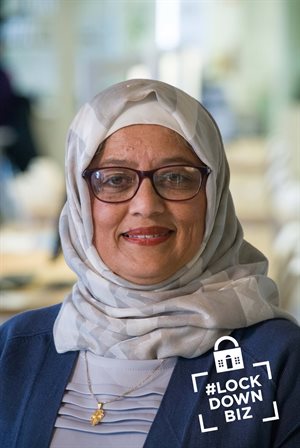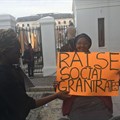This is a wake-up call about inequality - Feryal Domingo, Inyathelo

We chatted to Feryal Domingo, operations director at Inyathelo, to get her take.
What was your initial response to the crisis/lockdown and has your experience of it been different to what you expected?
Feryal Domingo: Our first port of call was to inform the board of our virtual office work plans, and to confirm their support. Our trustees’ availability and counsel have been a source of great encouragement. The Covid-19 pandemic has naturally been a learning curve for all of us, but we have been boosted by the commitment and resolve of management and staff. We have been fortunate in that good governance and forward financial planning have ensured we have financial reserves to sustain us.
Comment on the impact of the Covid-19 pandemic on your organisation or economy as a whole.
Domingo: Department of Social Development (DSD) statistics put the number of local NPOs at 201,644 in 2019. A study by the Funding Practice Alliance showed that the majority of local NPOs are newly established and micro (annual income below R50,000) to small (annual income above R50,000 and below R500,000). Many South African non-profit organisations (NPOs) are already on a precarious financial footing, and they face an even more uncertain future given the coronavirus pandemic. This is despite their services being so valuable, whether it is providing shelter for the homeless to setting up soup kitchens.
How is your organisation responding to the crisis?
Domingo: Our focus has been two-fold: ensuring support for our staff and ensuring their safety, and productivity; and, as a capacity-building and training organisation, advising other NPOs on building resilience and putting systems in place to boost the prospect of long-term sustainability.
Comment on the challenges and opportunities.
Domingo: NPO staff are working under extremely challenging conditions and experiencing considerable stress. The already precarious financial state of many NPOs has been exacerbated by the economic downturn and limited opportunities to network and fundraise. While NPOs' work becomes more important by the day, their resources are dwindling.
We have, accordingly, set up a portal so that NPOs and other organisations can access practical, accurate and relevant information, and find out more about resources to support their activities during this stressful time. For more information, click here.
Inyathelo also has numerous publications, training videos, toolkits and research reports online, many of which can be accessed free of charge. We encourage NPOs to make use of these resources to help them navigate the current crisis and to better position themselves to attract support.
How has the lockdown affected your staff? / What temporary HR policies have you put in place regarding remote working, health & safety, etc.?
Domingo: We considered health and safety risks facing staff using public transport; and those key staff who are required to support the organisation’s business model, and how this would impact on servicing our non-profit rental clients working from the Inyathelo offices. We also put in place measures to ensure all staff have the relevant tools, equipment and data capacity to work safely from home; and work plans and schedules to ensure that those working remotely feel included and participative in the ongoing work required to deliver on the mission of the organisation. We obtained the approval of the board for our plans, and with their support, we ensured that our staff would have some form of secure livelihood during the lockdown period.
How are you navigating ‘physical distancing’ while keeping your team close-knit and aligned?
Domingo: Staff at most NPOs are grappling with uncertainty, fear and anxiety and it is important to address concerns and questions. We have found it important to be clear about the challenges one is facing and the goals one is prioritising. Ask staff to voice their ideas and you will have stronger buy-in when it is time to implement changes. Staff mostly need assurance that they have jobs, so keeping in touch and making sure that they know what track the organisation is on, are key. Don’t leave anything out. No surprises. This is a worrying time, but if it is properly managed, the people in your organisation could emerge closer than ever and committed to the vital work they do.
How have you had to change the way you operate?
Domingo: At Inyathelo, we have been appraising our vision and mission and strategic interventions for several months. The coronavirus pandemic has brought new urgency and depth to our deliberations. How can we broaden our sphere of contribution and influence to include more community-based organisations? What can we do to support them, to build capacity and strengthen them in their work? Simultaneously, how can we be more strategic and effective in partnering with others to bring about systemic change to the underlying systems? How to facilitate conversations and bridge impasses?
Covid-19 will usher in a new world order. We are challenged to reassess how we will express our solidarity with our fellow human beings, and how we will partner to bring about a fairer and more just social order.
Any trends you’ve seen emerge as a result of the crisis?
Domingo: We have seen some extremely well-run neighbourhood operations – often manned by volunteers – that are providing vital services. Cape Town Together is a movement supporting neighbourhood action around Covid-19 and there are sterling examples of street champions and volunteers offering services such as soup kitchens and mask-making. We have re-ignited interest and collaborations with players in the sector, with the full realisation of how important it is to work together in order to strengthen this very important civil society sector. It is certainly more cost effective!
On a macro level, we would like government to recognise and support the true role that NPOs play. While the president committed himself in the 2018 SONA to the notion of a social compact with civil society, we need to improve the interface between civil society, government, business and philanthropy. We need to boost government’s working relationship with the sector.
Your key message to those in the sector?
Domingo: It is important – despite the current extreme pressures of lockdown ‒ to try to plan ahead and run a tight ship. Our experience is that both new and long-established NPOs are frequently ill-informed about the need for effective governance.
This can result in NPOs losing registration status and benefits; misunderstandings grow between the governing body and operational staff; there is mismanagement of financial affairs; and they incur penalty fees for not submitting documents on time to public offices. With many NPOs facing a dire economic future, addressing these issues now can help avoid losing out on potential donor funding due to non-compliance.
What do you predict the next six months will be like?
Domingo: Covid-19 brings a deadly addition to a list of already untenable conditions in numerous townships and informal settlements: limited access to basic public services, unemployment, and high levels of crime, violence, HIV and Aids. Social distancing is virtually impossible when many families live in small, poorly ventilated shacks and only have access to filthy public toilets, let alone gaining access to preventative supplies such as hand sanitiser.
For the NPO sector, the pandemic has posed practical questions on how to help deliver basic supplies and services and help lower the rate of infection. In addition, it also begs examination of systemic issues of inequality, of social justice and helping to bring about profound shifts in our unequal society.
This is a wake-up call about inequality that questions our commitment to bringing about real change.
We also need to hold state institutions such as the National Lottery Distribution Trust Fund and the Solidarity Fund to account, and to monitor and report on their ability to deliver to intended recipients. We also need to advocate for institutional reform in order to improve the flow of resources to civil society organisations.
About Sindy Peters
- 2022 Lesedi Award winner Faeeza Marshman on what drives her giving spirit - 9 Dec 2022
- #ESGAfricaConference: Why integrating the environmental and social components of ESG is key - 3 Nov 2022
- #ESGAfricaConference: ESG an opportunity for purposeful shareholder engagement - 1 Nov 2022
- #ESGAfricaConference: Success in ESG starts with leadership, partnerships and good governance - 31 Oct 2022
- #ESGAfricaConference: What should ESG reporting look like in Africa? - 26 Oct 2022
View my profile and articles...



